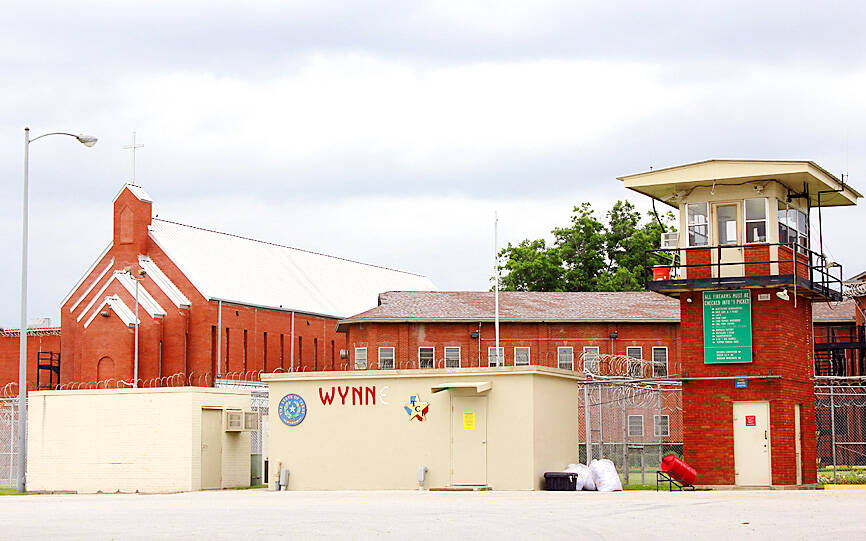In the afternoon on Tuesday last week, as Americans were celebrating the country’s independence with elaborate fireworks displays, a prisoner named Joseph Martire passed out in his cell in Texas, amid the excessive heat that has been swamping much of the southern US over the past few days.
In concrete, brick and metal penitentiaries, industrial fans churn warm vapor without really cooling the air, and with no air-conditioning in most prisons, when outside temperatures exceed 40°C, it can feel even hotter inside the cells.
Some prisoners sabotage the toilets in their cells to make the water overflow and wet the floor, which they then sleep on. Others wet their clothes to try to stay cool, convicts, former convicts and family members told Agence France-Presse.

Photo: AFP
Over the past few weeks, 35-year-old Martire had four heat-related health episodes at Estelle Prison in Huntsville, where he has served 16 years.
“I just passed out, the medical [staff] refused to see me and I don’t know what to do,” he told his family by telephone.
They called prison administrators to seek help.
When inmates sense that someone has passed out in a nearby cell, they yell to attract a guard’s attention, but staff shortages often mean delays, Martire said.
The stricken inmate is then taken to an administrative area of the jail that does have air-conditioning for so-called “respite.” Prisoners try to linger as long as possible.
“I’ve already had too many issues with my health before from the heat,” Martire said.
Asked what the heat in the cells is like, Amite Dominick, president and founder of the non-governmental organization Advocates for Texas Community Prisons, said: “The fastest way I can explain that is, go sit in your car on a triple-digit day. Bring a blow-dryer with you. Crack your window a little bit.”
The Texas Tribune news site reported that at least nine people had died in state prisons last month from heart attacks or other possibly heat-related causes.
However, Amanda Hernandez, spokeswoman for the Texas Department of Criminal Justice, which is in charge of prisons, said the last heat death occurred in 2012.
Last month, the department treated seven cases of people affected “beyond first aid,” but there were no fatalities, she said.
The department, which oversees 126,000 prisoners, said that 32 people died last month from a variety of causes.
Dominick took issue with that breakdown.
“The coroner will usually report something like ‘cardiac arrest’ because heat stroke is highly correlated with cardiac arrest,” she said. “We’re seeing the same reports. We’re seeing medical evidence for what happens to the body.”
“You know, during these types of temperatures, these are heat-related deaths,” Dominick added.
Sean Adams, 36, served time in a prison called the Clemens Unit, in the Texas city of Brazoria, but which inmates call “Burns Like Hell.”
“It’s one of the older units that was made out of, you know, red bricks, and so red bricks are essentially what ovens are made out of,” Adams said.
The prisons agency said inmates have access to ice and water, and can go to air-conditioned rest areas when necessary, and Texas is unlikely to get cooler.
By 2050, the state is projected to see 115 dangerous days of heat a year, with temperatures reaching or exceeding 39.4°C, compared with about 60 such days today, the non-governmental organization Climate Central said.
Samantha, whose daughter is a 25-year-old inmate at the Lane Murray prison, said three prisoners died there last month from heat-related causes.
“The way that they’re treated is so inhumane,” she said.
“In the summer months, when you’re inside, you see multiple heat-induced seizures every day,” said Marci Marie Simmons, a 44-year-old former convict and advocate.
She said that late last month, a 36-year-old inmate died in the Estelle prison hours after speaking with his mother and complaining about the heat.
Dominick said legislative efforts to do something about the heat have fallen short, with bills demanding air-conditioning in prisons withering in the conservative-majority Texas Senate.

STEPPING UP: Diminished US polar science presence mean opportunities for the UK and other countries, although China or Russia might also fill that gap, a researcher said The UK’s flagship polar research vessel is to head to Antarctica next week to help advance dozens of climate change-linked science projects, as Western nations spearhead studies there while the US withdraws. The RRS Sir David Attenborough, a state-of-the-art ship named after the renowned British naturalist, would aid research on everything from “hunting underwater tsunamis” to tracking glacier melt and whale populations. Operated by the British Antarctic Survey (BAS), the country’s polar research institute, the 15,000-tonne icebreaker — boasting a helipad, and various laboratories and gadgetry — is pivotal to the UK’s efforts to assess climate change’s impact there. “The saying goes

Police in China detained dozens of pastors of one of its largest underground churches over the weekend, a church spokesperson and relatives said, in the biggest crackdown on Christians since 2018. The detentions, which come amid renewed China-US tensions after Beijing dramatically expanded rare earth export controls last week, drew condemnation from US Secretary of State Marco Rubio, who on Sunday called for the immediate release of the pastors. Pastor Jin Mingri (金明日), founder of Zion Church, an unofficial “house church” not sanctioned by the Chinese government, was detained at his home in the southern city of Beihai on Friday evening, said

TICKING CLOCK: A path to a budget agreement was still possible, the president’s office said, as a debate on reversing an increase of the pension age carries on French President Emmanuel Macron yesterday was racing to find a new prime minister within a two-day deadline after the resignation of outgoing French Prime Minister Sebastien Lecornu tipped the country deeper into political crisis. The presidency late on Wednesday said that Macron would name a new prime minister within 48 hours, indicating that the appointment would come by this evening at the latest. Lecornu told French television in an interview that he expected a new prime minister to be named — rather than early legislative elections or Macron’s resignation — to resolve the crisis. The developments were the latest twists in three tumultuous

FIRST STAGE: Hamas has agreed to release 48 Israeli hostages in exchange for 250 ‘national security prisoners’ as well as 1,700 Gazans, but has resisted calls to disarm Israel plans to destroy what remains of Hamas’ network of tunnels under Gaza, working with US approval after its hostages are freed, it said yesterday. Israeli Minister of Defense Israel Katz said that the operation would be conducted under an “international mechanism” led by the US. “Israel’s great challenge after the hostage release phase will be the destruction of all Hamas terrorist tunnels in Gaza,” Katz said. “I have ordered the army to prepare to carry out this mission,” he added. Hamas operates a network of tunnels under Gaza, allowing its fighters to operate out of sight of Israeli reconnaissance. Some have passed under